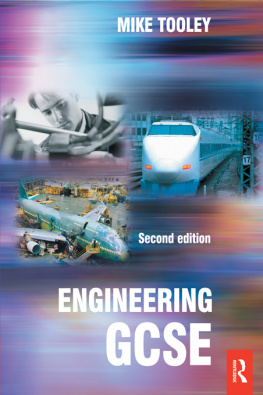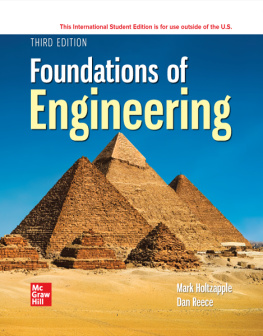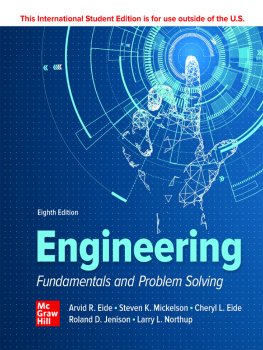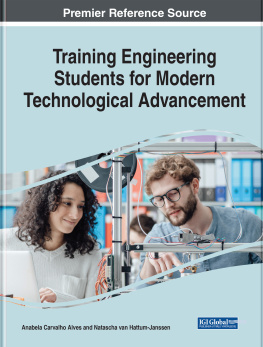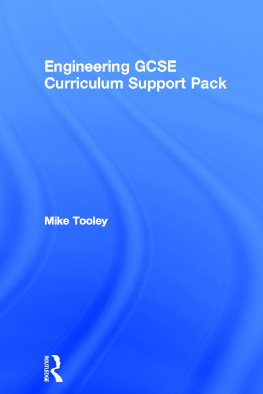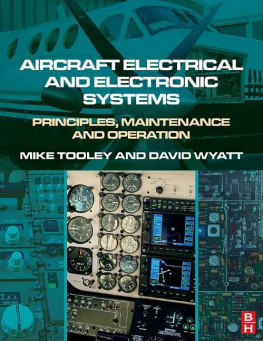
Engineering GCSE
Engineering GCSE
Second edition
Mike Tooley
ex-Vice Principal
Brooklands College of Further and Higher Education

Newnes
An imprint of Elsevier
Linacre House, Jordan Hill, Oxford OX2 8DP
30 Corporate Drive, Burlington, MA 01803
First published 2002
Reprinted 2003, 2004
Second edition 2005
Copyright 2005, Mike Tooley. All rights reserved
The right of Mike Tooley to be identified as the author of this work has been asserted in accordance with the Copyright, Design and Patents Act 1988
No part of this publication may be reproduced in any material form (including photocopying or storing in any medium by electronic means and whether or not transiently or incidentally to some other use of this publication) without the written permission of the copyright holder except in accordance with the provisions of the Copyright, Designs and Patents Act 1988 or under the terms of a licence issued by the Copyright Licensing Agency Ltd, 90 Tottenham Court Road, London, England W1T 4LP. Applications for the copyright holders written permission to reproduce any part of this publication should be addressed to the publisher
British Library Cataloguing in Publication Data
A catalogue record for this book is available from the British Library
Library of Congress Cataloguing in Publication Data
A catalogue record for this book is available from the Library of Congress
ISBN 0 7506 6576 9
For information on all Newnes publications visit our website at www/newnespress/com
Typeset by Charon Tec Pvt. Ltd, Chennai, India
Printed and bound in Great Britain

Contents
Unit 1 of the GCSE syllabus
Unit 2 of the GCSE syllabus
Unit 3 of the GCSE syllabus
Additional chapter for all students requiring further science and maths underpinning knowledge
Preface
Welcome to the challenging and exciting world of engineering! This book is designed to help you succeed on a course leading to the vocational GCSE qualification in Engineering. It contains all of the essential underpinning knowledge required of a student who has never studied engineering before and who wishes to explore the subject for the first time.
About you
Have you got what it takes to be an engineer? The Engineering GCSE will help you find out and still keep your options open. Engineering is an immensely diverse field but, to put it simply, engineering, in whatever area that you choose, is about thinking and doing. The thinking that an engineer does is both logical and systematic. The doing that an engineer does can be anything from building a bridge to testing a space vehicle. In either case, the essential engineering skills are the same.
You do not need to have studied engineering before starting the GCSE course. All that is required to successfully complete the course is an enquiring mind, an interest in engineering, and the ability to explore new ideas in a systematic way. You also need to be able to express your ideas and communicate these in a clear and logical way to other people.
As you study this course, you will be learning in both a classroom and a workshop environment. This will help you to practice the things that you learn in a formal class situation. You will also discover that engineering is fun its not just about learning a whole lot of meaningless facts and figures!
About Engineering GCSE
The GCSE Engineering is a nationally recognised and accredited qualification designed to provide you with a choice of routes into further education or employment. The GCSE in Engineering is a double award equal to two GCSEs. It is therefore twice the size of most GCSEs and represents twice the work that would normally be associated with a single award. The GCSE in Engineering is a vocational GCSE. This means that it is directly relevant to anyone who may be thinking about a career in engineering.
(Engineered Products) but in this chapter you will also have the opportunity to produce an engineered product. Your teacher or lecturer will suggest what this should be and he or she will also help to ensure that you have the right materials and resources to complete the task!
In (Application of Technology) you will investigate the use of technology through a series of open-ended case studies. Its also worth remembering that a study of engineering requires a good grasp of science and mathematics. So, if you intend to study engineering at a higher level, it is important that you develop your skills in these subjects, at the same time as studying for your GCSE in Engineering.
How to use this book
This book covers the three units that make up the Engineering GCSE double award programme. The first three chapters are devoted to each of the three assessed units and each of these chapters contains text, key points, test your knowledge questions, activities, and review questions.
Since many GCSE students have difficulty with science and mathematics, we have included an extra chapter on Maths and Science for Engineering. Whilst this additional chapter is not part of the GCSE double award and is therefore not part of the GCSE assessment, it has been designed to complement the other chapters and also to provide the essential maths and science underpinning knowledge that will allow students to progress to engineering courses at a higher level. Furthermore, unlike GCSE Maths and Science courses, all of the topics, questions and examples in this fourth chapter relate directly to engineering applications.
The second edition of Engineering GCSE has been considerably enhanced and expanded to include a number of new topics. These include new activities on interpreting client design briefs and using CAD packages, and new sections on quality control and quality assurance, health and safety, casting and milling, and systems and control technology.
The test your knowledge questions are interspersed with the text throughout the book. These questions allow you to check your understanding of the preceding text. They also provide you with an opportunity to reflect on what you have learned and consolidate this in manageable chunks.
Most test you knowledge questions can be answered in only a few minutes and the necessary information can be gleaned from the surrounding text. Activities, on the other hand, require a significantly greater amount of time to complete. Furthermore, they often require additional library or resource area research coupled with access to computing and other information technology resources.
Activities are the means by which you generate the portfolio evidence needed to satisfy the assessment requirements for Units 1 and 2 (note that Unit 3 is assessed by means of a written examination). As you work through this book, you will undertake a programme of activities as directed by your teacher or lecturer. Dont expect to complete all of the activities in this book your teacher or lecturer is expected to ensure that those activities that you do undertake will generate ample assessment evidence. Activities also make excellent vehicles for gathering the evidence that can be used to demonstrate that you are competent in core skills.
These essential features of Engineering GCSE 2e provide vital practice material for the GCSE course, but are not intended as an assessment instrument to replace Edexcel assessment materials.
Next page
